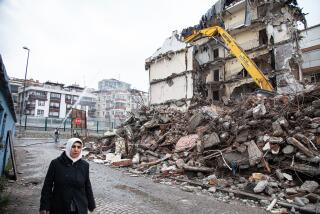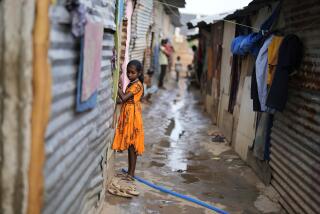Family in India Makes Sea Its Doormat
- Share via
MUMBAI, India — They are a family living on the edge -- literally.
At high tide, the Arabian Sea sometimes sprays saltwater right into the shack of the extended Den family, and the children play in the rough waves just outside their door as other youngsters might play in a park.
It’s hard to believe anyone can live here. But in a city with some of the world’s most expensive real estate, they have no choice. Their seaside ancestral home, where the family had lived among other poor fishermen for generations, was torn down in 2003 to make way for the lawn of an upper-middle-class apartment complex.
They had no documents to prove ownership of their home. Ordinarily that would be no problem -- Indian fishermen traditionally have made their homes by the sea, no questions asked.
But the hot real estate market is undercutting those time-honored ways. This is a city where close friends happily share food and the challenges of life. But nobody -- nobody -- shares their house.
So the Den family found its way here, fashioning a home from old boards, bamboo poles and battered sheets of plastic, creating a new life atop a pile of rocks. Above them, a billboard exhorts consumers to invest in high-end cellphones.
It is now home to a family of three brothers, their partially blind father and half a dozen children. Ten people sleep here every night.
The city treats the family with frustrating ambivalence. At least a few times a year, city workers come through to tear down their house. It’s an eyesore, the bureaucrats say, and squeezed into an area where no building is allowed. Every time, the family rebuilds.
But other city workers have issued them lifeguard ID cards. Their shack is just a few hundred yards from one of the city’s most famous mosques, an 18th century shrine to the Muslim Sufi saint Hazrath Haji Ali, built on an island linked to the mainland by a causeway that is submerged at high tide. When the crowds come out, and the occasional person falls in, family members are called to the rescue.
Even the children, who swim dolphin-like in the threatening seas, are sometimes called for help.
The family still lives, at least partly, off the sea. When the water is calmer, they venture out in small boats to catch all sorts of fish. When the sea is rough, they sell cigarettes, chewing tobacco and salted cucumber slices to tourists.
As the children played in the water on a recent day, tourists gathered to watch.
One of the three brothers, Mohammed Hanif, cleared the visitors away with the commanding tone of a patriarch.
“Can’t you see?” he demanded. “This is a passage to our house.”
More to Read
Inside the business of entertainment
The Wide Shot brings you news, analysis and insights on everything from streaming wars to production — and what it all means for the future.
You may occasionally receive promotional content from the Los Angeles Times.










